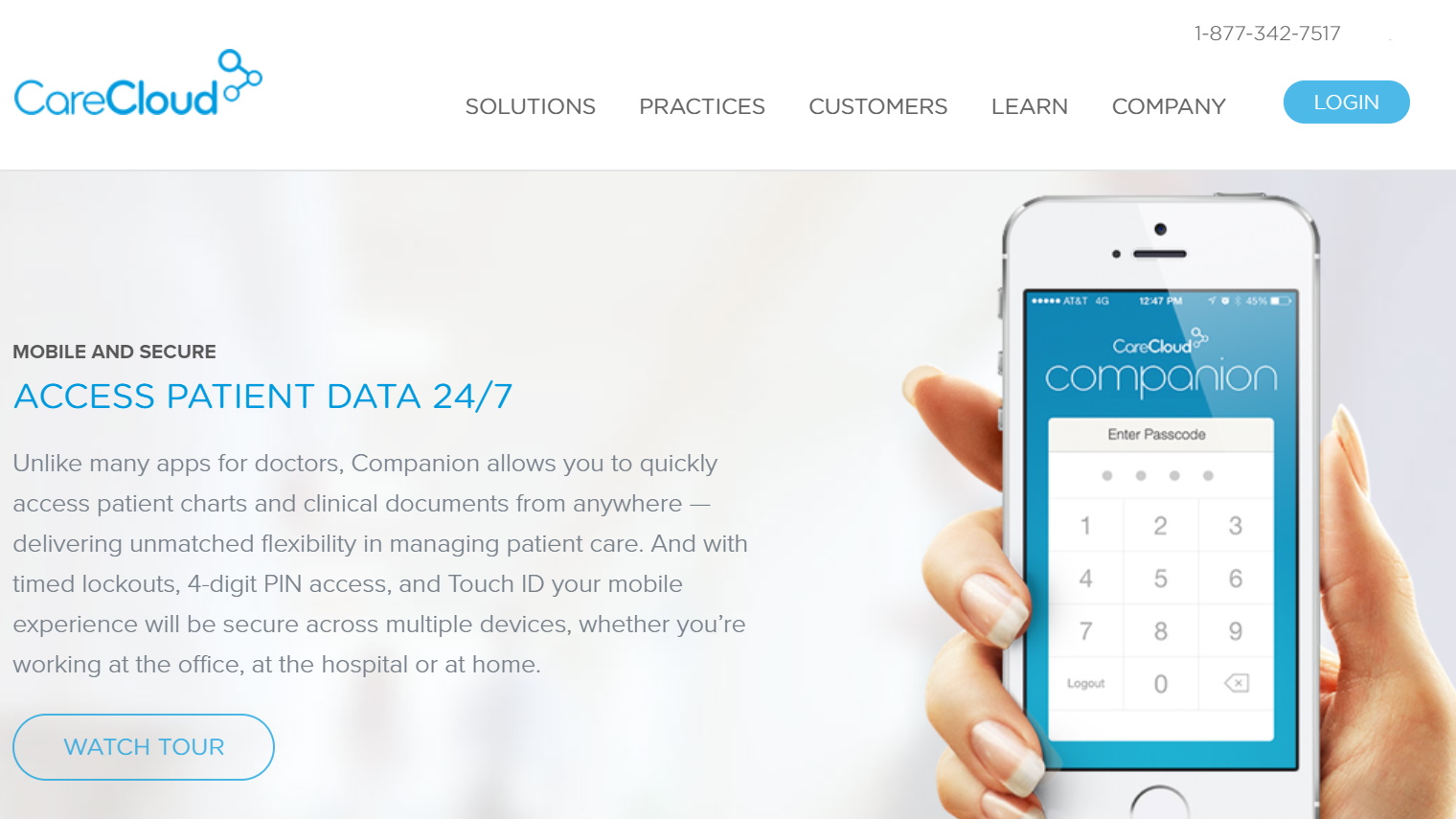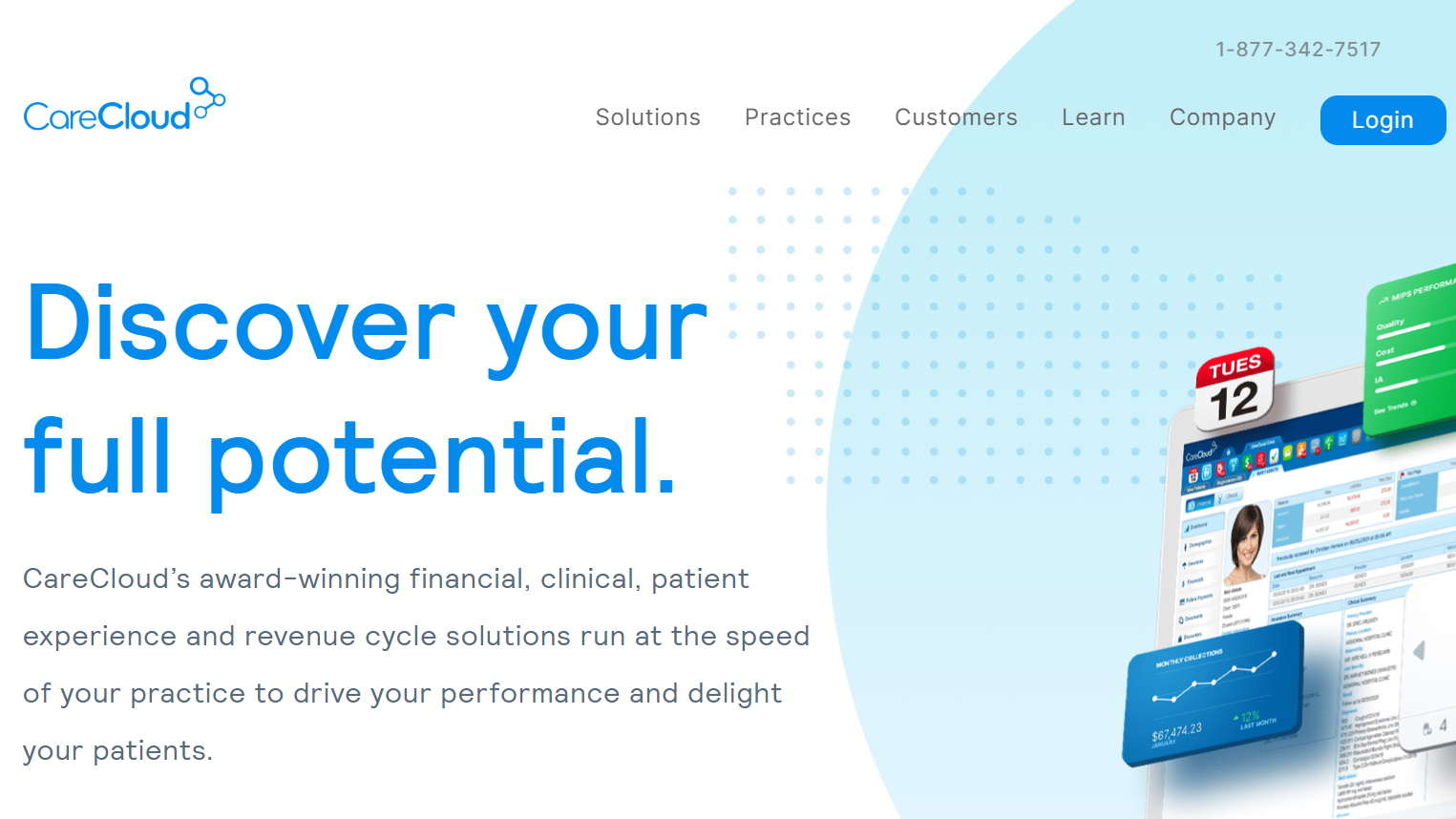TechRadar Verdict
CareCloud has a powerful billing solution at a lower rate than some competitors, but the higher startup costs, and lack of support options prevents us from giving it a higher recommendation.
Pros
- +
Lower cost over time
- +
Supports open standards
- +
Integrated EHR and revenue cycle management
- +
ICD-10 ready
Cons
- -
Limited support hours and options
- -
High startup costs
- -
Patient billing errors
- -
Lacks free trial
Why you can trust TechRadar
CareCloud can trace its origins back to 2009, with its founding by Albert Santalo. It is currently a private corporation, offering software as a service (SaaS), and revenue cycle management (RCM) to practices in over 50 specialties, and across the 48 states in the US, managing over $4 (£3.05) billion in annualized accounts receivables to their clients.
The company has a good track record of incorporating technology into their products, including the launch of their mobile app in 2014, and joining the CommonWell Health Alliance, which works on open standards between EHR’s from different manufacturers.
Features
Hardly a one trick pony, CareCloud offers a suite of services, which includes practice management, revenue cycle management, their electronic health record, and advanced billing rules among other professional services. Their billing service is dubbed ‘CollectiveIQ,’ and incorporates what is called Advanced Billing Rules.
For starters, CareCloud is designed to navigate the latest in diagnosis codes. With the exponential growth in diagnostic codes that happened with ICD-10, it is reassuring to know that CareCloud is ICD-10 ready, and will be continuously kept up to date with the latest in billing codes. This is a crucial first step in making sure that claims go through, and don’t get snagged due to poor coding by clinicians not familiar with the latest medical coding practices.
Another major issue that CareCloud helps with is to reduce the frequency of rejected claims, a problem that can easily quagmire a practice as it delays payment for services already provided, and reduces the available cash for the practice. CollectiveIQ reports that it has an “Unparalleled clinical coding knowledge base,” that works to achieve a high rate of claims paid on the first attempt, which is an ideal and efficient goal. With its database of literally millions of submitted claims to both commercial payers, and Medicare, CareCloud can apply this large billing experience to your practice’s claims, to give each submitted claim the highest chance that it goes through on the first attempt.

While not every EHR and billing service has a mobile app, we are pleased to report that CareCloud has addressed this need. While it is only available for iOS, the CareCloud Companion app is available to be used on Apple smartphones and tablets. This allows users to access data anywhere they are, and not be tethered to the office to access information.
Drawbacks
CareCloud users do report some issues. For example, a dermatology practice reports that CareCloud has repeated errors in the remittances. Multiple patients brought their bills, with their payments, and there were multiple data entries on CareCloud’s part, leading to additional office staff time to correct, and dissatisfied patients- both of which are significant problems. This office also lamented that CareCloud did not have a better patient portal where patients could directly logon and make the payments, and have them accurately tallied.
Sign up to the TechRadar Pro newsletter to get all the top news, opinion, features and guidance your business needs to succeed!
Still others indicate that CareCloud does not accept the claims instantly on an ongoing basis. Rather, the claims need to be submitted as a separate step, and if this is not done by 8 PM for that day, they cannot be sent, and need to wait for the next day. This sounds to us more like a mailbag and physical pickup, rather than a robust, internet based billing service.
Another issue is the lack of an Android app. As it is the most common mobile platform, we would like to see a CareCloud app to cover this need as well.
A final issue is that the CollectiveIQ can only be used with the rest of the CareCloud suite, including their EHR. In other words, this billing service can only be used on a single platform, and not with your existing EHR unless it already randomly is CareCloud.
Support
Support for CareCloud, according to their website, is limited to a single option, the telephone. While many users prefer having that option for more complicated issues, it is also good to have some other, less time limited options, such as email, an online portal, chat, and also self help options such a forum, or webinars, but CareCloud does not offer any of these. Furthermore, via their toll free number, the hours are limited to 8 am to 9 pm EST, with the additional limitation of only on weekdays.
This unfortunately puts CareCloud behind what some other competitors offer in the support department.
Pricing
In what is quite routine for this industry, contact with the company is required to obtain a quote for the pricing. This can be a downside at a busy practice, eager to cross shop solutions if each quote requires such an investment in time and effort, limiting the number of quotes that can be obtained reasonably. There is an offer for a free demo, but alas no free trial.
Further research off the CareCloud website did yield some pricing info. Unlike some other billing solutions, CareCloud incorporates some significant upfront costs, including $5000 (£3809) for each provider for the first three, and then $2750 (£2095) more for additional providers. This is justified by CareCloud to enroll providers in the Electronic Data Interchange (EDI), so the practice can then submit claims, and be paid electronically.
However, beyond the startup, CareCloud’s costs are more reasonable, as it charges a fixed percentage of 3% to 7% of the net collections, which at the lower end can be significantly less than some of its competitors.
Final verdict
CareCloud CollectiveIQ is an attractive billing companion to the CareCloud EHR. The strengths include the iOS mobile app, the ability to decrease payment rejections, and keeping up to date with ICD-10 billing codes. The weaknesses include a lack of Android app, high startup costs, and limited support options. Another barrier is the limitation that to use this billing service, you also need to use the CareCloud EHR, but otherwise there are lots of features to like with CareCloud CollectiveIQ.
- We've also highlighted the best medical billing services
Jonas P. DeMuro is a freelance reviewer covering wireless networking hardware.
